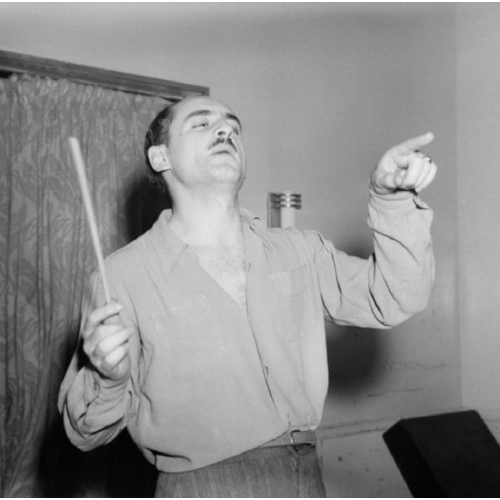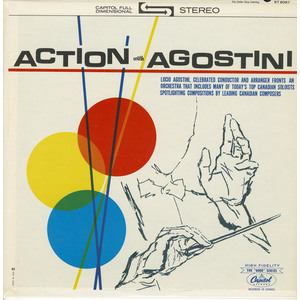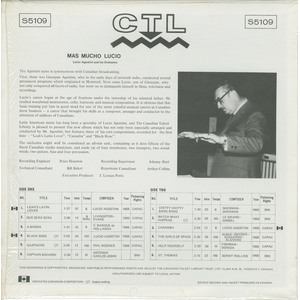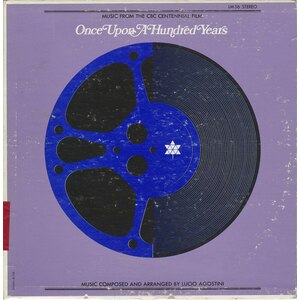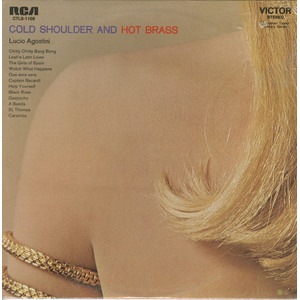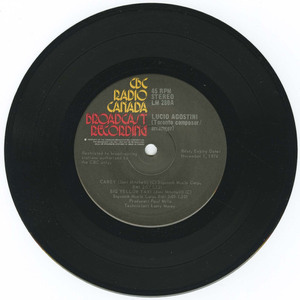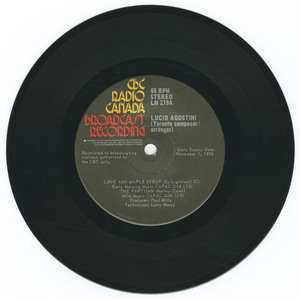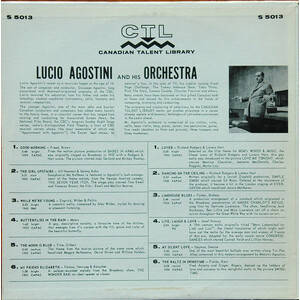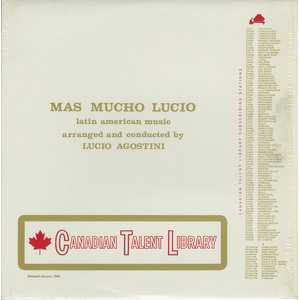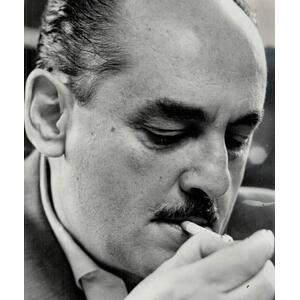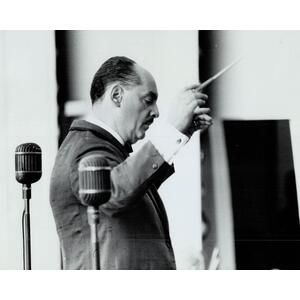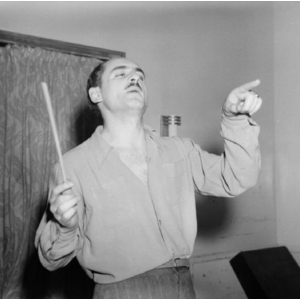Agostini, Lucio
Websites:
No
Origin:
Fano, Italy → Montréal, Québec → Toronto, Ontario, 🇨🇦
Biography:
Lucio Agostini (December 30, 1913 – February 15, 1996) was one of Canada’s most prolific and versatile composers, arrangers, and conductors, whose career spanned the formative years of Canadian radio, film, and television. Born in Fano, Italy, he emigrated to Montreal with his parents in 1919. His father, Giuseppe Agostini, a respected composer and conductor, instilled in him a love of music and gave him his earliest training in woodwinds, cello, harmony, and composition. By fifteen, Lucio was already playing saxophone, clarinet, and cello in his father’s orchestra; at sixteen he joined the Montreal Philharmonic Orchestra under Eugène Chartier, laying the foundation for a career defined by technical mastery and stylistic range.
In the 1930s, Agostini quickly emerged as a conductor and arranger for Montreal radio. His first professional engagement came with CFCF, and by 1932 he was writing film scores for Associated Screen News, where he remained until 1944, ultimately serving as music director. His scores for the National Film Board’s wartime shorts—including the Canada at War and The World in Action series—brought his work to millions. At the same time, he became a vital presence in Canadian broadcasting, conducting for the CRBC and later the CBC, where he composed and directed music for programs such as Stage (1944–55), Ford Theatre (1949–55), CBC Wednesday Night, and countless radio dramas and variety shows. His work for Shakespeare productions inspired his Shakespearean Suite for Strings (1948), a piece that remains one of his most enduring concert works.
Agostini’s reputation rested not only on his speed and precision, but also on his ability to bring drama and colour to every assignment. As Pierre Berton once remarked, “Lucio was one of the best two or three composers and directors for television, radio, films, that we had in Canada. He was very inventive for the kind of things he was doing. He was very fast—and very good.” These qualities made him the first call for a wide range of CBC projects, from variety specials to ambitious dramas. His own series—including Strictly for Strings, Appointment with Agostini, Music Album, Collage, and Music to Remember—further cemented his presence in Canadian households. From the 1950s onward he also served as conductor and arranger for Front Page Challenge, a role he maintained for over two decades, and music director for the Juliette show during its peak years.
Though broadcasting was his main arena, Agostini also composed extensively for film and the stage. His musicals included Willie the Squowse (1968), Gibraltar (1975), and Divorce (1976), while his film scores ranged from Inside Out (1975) and Ragtime Summer (1977) to animated features like The Little Brown Burro (1978) and Ichabod Crane (1978). In the concert hall, his Piano Concerto (1948) and Flute Concerto (1960) revealed his symphonic breadth, the latter recorded by Nicholas Fiore with the Albert Pratz Orchestra for the RCI label. His Trio Québécois (1970), written for clarinetist Avrahm Galper, demonstrated his skill for chamber textures. Even late in his career he continued composing, including the incidental music for the 1980 CBC dramatization of Robertson Davies’ Fifth Business.
Agostini’s recordings for the Canadian Talent Library further showcased his versatility, with albums such as Mas Mucho Lucio (1968), which featured his original compositions Leah’s Latin Lover, Caramba, and Black Rose, and Cold Shoulder and Hot Brass, a brassy set of standards and originals. His centennial soundtrack Once Upon a Hundred Years (1967), recorded with Moe Koffman, Rob McConnell, Guido Basso, and other leading Canadian jazz musicians, remains a vibrant time capsule of the optimism and energy of 1960s Canada.
His contributions did not go unnoticed: he won four successive Canadian Radio Awards as best composer-conductor, and in 1983 received ACTRA’s John Drainie Award for distinguished contributions to Canadian broadcasting. He also arranged and conducted for leading Canadian singers such as Alys Robi, Juliette, and Tony Ziccardi, and collaborated with musicians as diverse as Bert Niosi, Erich Traugott, Moe Koffman, Peter Appleyard, and Guido Basso.
Lucio Agostini died in Toronto in 1996 at the age of 82, leaving behind a vast legacy of music that touched nearly every Canadian household for half a century. His manuscripts are preserved at Library and Archives Canada, ensuring that his contribution to the nation’s musical and cultural life endures. A bridge between the orchestral tradition of his European roots and the emerging voice of Canadian popular and broadcast music, Agostini remains one of the central figures in the country’s artistic history.
-Robert Williston
